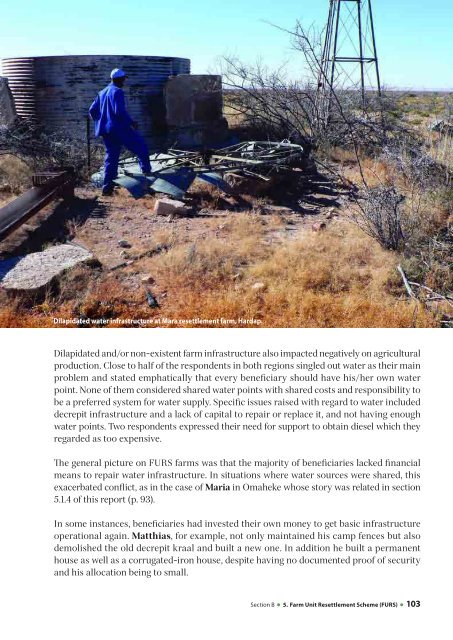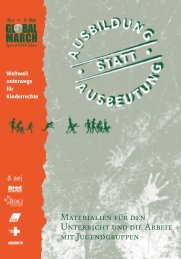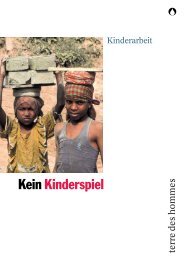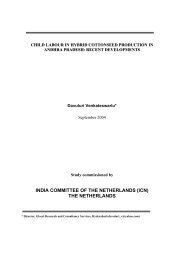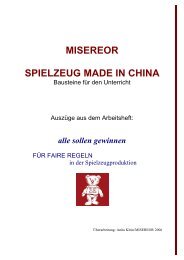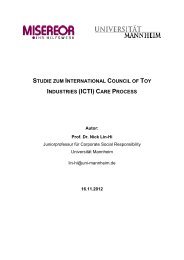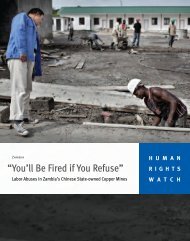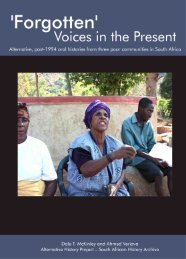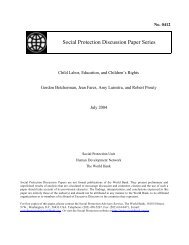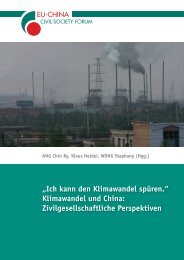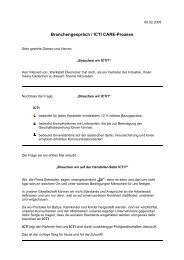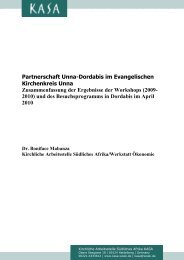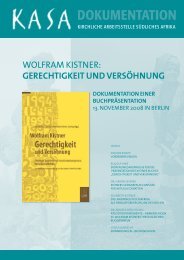- Page 2 and 3:
© Land, Environment and Developmen
- Page 4:
Leading the Fieldis a publication o
- Page 8 and 9:
AcknowledgementsThe three-and-a-hal
- Page 17 and 18:
2 LAND REFORM ANDPOVERTY: NATIONALP
- Page 19 and 20:
Poverty in Omaheke.Poverty in Harda
- Page 21:
the concern was expressed that “i
- Page 24 and 25:
As will be discussed below, a numbe
- Page 28 and 29:
from Germany in 1907 (Werner forthc
- Page 31:
2.4 Land reform and rural developme
- Page 34 and 35:
The Agricultural (Commercial) Land
- Page 38 and 39:
Policy (RoN 1998: 1). What defined
- Page 40:
The determination of a viable unit
- Page 44 and 45:
Cabinet Minister who argued that th
- Page 47 and 48:
in Hardap criticised government for
- Page 49 and 50:
A farm in Hardap - enforcing privat
- Page 51 and 52:
The process from land acquisition t
- Page 53 and 54:
Herero traditional leaders ascribed
- Page 55 and 56:
Table 5: Institutions involved in l
- Page 59 and 60: 3 REGIONAL CONTEXTS3.1 HardapSpanni
- Page 61 and 62: Namibia as a whole has declined ste
- Page 63: Plowing for crop cultivation at Sko
- Page 69: Bernard bought a farm through the A
- Page 72 and 73: All of the AALS farmers surveyed in
- Page 74 and 75: Marketing channels for weaners in O
- Page 78 and 79: The tight financial position of som
- Page 80 and 81: 4.3 Typology of livelihood strategi
- Page 82 and 83: he had about 600 in 2008. In additi
- Page 84 and 85: The second stage of the ‘cyclical
- Page 86 and 87: did not offer alternative land, but
- Page 88 and 89: 4.4.4 The ‘broekskeur en vasbyt
- Page 91: in town is too fast and one is not
- Page 94 and 95: Table 9: Age and gender distributio
- Page 96 and 97: Figure 1: Education levels in FURS
- Page 98 and 99: Only two beneficiaries in the whole
- Page 100: 5.1.3 Settlers’ relationship with
- Page 103 and 104: stated that they would be able to f
- Page 105 and 106: cows of all three farmers were serv
- Page 108 and 109: Table 19: Gross incomes of FURS liv
- Page 112 and 113: 5.2.5 MarketingTable 21 summarises
- Page 114 and 115: the remainder of the year, goats ar
- Page 116 and 117: 5.2.7 SkillsAlthough many FURS bene
- Page 118: The most common crops grown were ma
- Page 121: 5.5 Livelihood trajectoriesBased on
- Page 124 and 125: Previously a part-time farmer in a
- Page 126: of the allocated unit, but the numb
- Page 129 and 130: e accommodated by the National Rese
- Page 131 and 132: 6 GROUPRESETTLEMENTSCHEMESOfficiall
- Page 134 and 135: Low levels of education further lim
- Page 136: William did not really want to farm
- Page 139 and 140: age, they decided that he had worke
- Page 141 and 142: which was too far away to visit as
- Page 144 and 145: Expenses for the group scheme farme
- Page 146 and 147: phoned the MLR in Gobabis to send a
- Page 148 and 149: they never learnt to save. They sho
- Page 150 and 151: idea was to grow crops and sell the
- Page 152: At Bernafey, 7 beneficiaries involv
- Page 156 and 157: Housing at BernafeyHousing at Drimi
- Page 158 and 159: 6.3.2 Other livelihood strategiesBe
- Page 161 and 162:
6.3.2.3 Piece workWork on other far
- Page 163 and 164:
A shop at Drimiopsisshop as a livel
- Page 165 and 166:
When Alfons settled at Skoonheid in
- Page 167 and 168:
Farm workerLoses job / unemployedBe
- Page 169 and 170:
there. Instead, the MLRR advised hi
- Page 171 and 172:
the major issues identified in sect
- Page 173 and 174:
LaLR fieldwork at Bernafey.LaLR stu
- Page 175 and 176:
such external support was available
- Page 177 and 178:
formal lease agreement. Many people
- Page 179:
communal areas at minimal costs for
- Page 182 and 183:
study sample also complained about
- Page 184 and 185:
The National Resettlement Policy pr
- Page 186:
REFERENCESAbrahams, K. 1982. “The
- Page 189 and 190:
Namibia Agricultural Union. 2003. A
- Page 191 and 192:
Livelihoods after Land Reform: Nami


